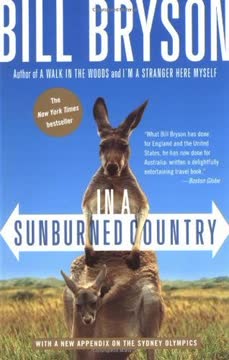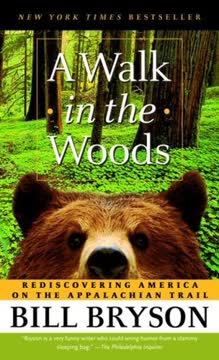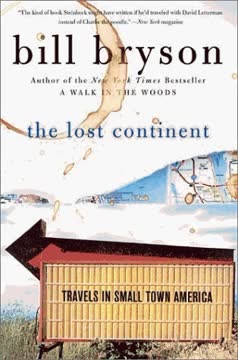Key Takeaways
1. Australia: A Land of Unique Dangers and Vast Emptiness
It has more things that will kill you than anywhere else.
Lethal wildlife. Australia is home to an astonishing array of dangerous creatures, making it arguably the most perilous continent. All ten of the world's most poisonous snakes are Australian, and five of its creatures—the funnel web spider, box jellyfish, blue-ringed octopus, paralysis tick, and stonefish—are the most lethal of their kind globally. Even seemingly innocuous cone shells can deliver a deadly sting.
Environmental hazards. Beyond the animals, Australia presents numerous environmental threats. Tourists face risks from powerful ocean currents, sharks, and crocodiles, while the baking outback can lead to a swift, unhappy death from dehydration or exposure. The country is the driest, flattest, hottest, and most climatically aggressive inhabited continent, with ancient, infertile soil.
Vast and empty. Despite its dangers, Australia teems with life, much of it unique to the continent (80% of all plant and animal species exist nowhere else). Its immense size, however, means much of it remains scarcely charted, so vast and empty that a non-governmental atomic bomb could theoretically be detonated in the remote outback and go unnoticed for years, as was once suspected with the Aum Shinrikyo cult.
2. The World's Neglect and Australia's Self-Perception
Australians can't bear it that we pay so little attention to them, and I don't blame them.
Global oversight. The rest of the world, particularly the United States, pays shamefully scant attention to Australia. Despite its stability, peaceful nature, and lack of geopolitical misbehavior, Australia ranks low in international news coverage, often on par with countries like Belarus or Burundi. This neglect is curious given the interesting events constantly unfolding there.
Self-critical nature. Australians are an extraordinarily self-critical people, often convinced that things are better elsewhere, despite their high quality of life. This self-assessment is reflected in pessimistic book titles about their own country and a tendency to overlook their significant achievements, such as their high ranking on the UN Human Development Index.
Quest for recognition. This yearning for external validation is palpable. Bryson notes that even minor historical events or obscure figures are celebrated, and there's a palpable pride in any international recognition, however small. This contrasts with their internal modesty and tendency to downplay their own successes.
3. The Outback: A Harsh, Unfathomable, and Alluring Wilderness
The punishing nature of Australia's interior is almost not possible to exaggerate.
Extreme conditions. The Australian outback is a land of inexpressible heat, constant water scarcity, and myriad miseries. Explorers faced stinging ants, thorny bushes, needle-sharp spinifex that caused festering sores, and the constant threat of scurvy. Even pack animals like horses and camels often succumbed to delirium and death from the brutal conditions.
Unfathomable allure. Despite these staggering privations and meager rewards, explorers repeatedly ventured into the outback, often becoming transfixed by its emptiness and compelled to push further. Figures like Ernest Giles endured immense suffering, even resorting to eating raw baby wallabies, yet returned to their compulsive wanderings.
Hidden wonders. The outback's vastness means it holds many secrets and wonders, often discovered by sheer luck. The Devil's Marbles, enormous granite boulders perched impossibly, are a lost wonder in the middle of nowhere. Similarly, the discovery of the pre-Cambrian Spriggina fossils in the Ediacaran hills was a miraculous find made by a geologist simply looking for shade.
4. From Prison Colony to Prosperous Nation: The Convict Legacy
Personally I think Australians ought to be extremely proud that from the most awkwardly unpropitious beginnings, in a remote and challenging place, they created a prosperous and dynamic society.
Unlikely beginnings. Australia began as a prison, with the First Fleet arriving in 1788 to establish a penal colony for small-time thieves. The decision was made without proper reconnaissance, sending 1,500 people to a virtually unknown, remote place. The early colonists faced immense hardship due to infertile land, lack of skilled labor, and hostile conditions.
A unique transformation. Despite these "awkwardly unpropitious beginnings," Australia transformed into a prosperous and dynamic society. The gold rushes of the 1850s, which saw hundreds of thousands flock to the country, effectively ended transportation and spurred rapid growth, turning a concentration camp into a burgeoning nation.
Lingering discomfort. Even today, there's a subtle discomfort with Australia's convict past, often "fudged" or "suppressed" in public narratives and historical accounts. However, Bryson argues that this origin story, far from being a "stain," is a testament to the resilience and ingenuity of the people who built a thriving society from such challenging foundations.
5. The Invisible People: Aboriginal History and Ongoing Challenges
When I say these are the world's invisible people, believe me these are the world's invisible people.
Ancient and unappreciated. The peopling of Australia by Aborigines tens of thousands of years ago represents a staggering human accomplishment, involving ocean crossings far predating any other known seafaring. They developed the oldest continuously maintained culture on Earth, mastering diverse environments, yet their history and achievements remain largely unacknowledged globally.
Colonial marginalization. From the moment of European contact, Aborigines were often viewed as subhuman or inconsequential, leading to their systematic marginalization. Until 1967, they weren't even included in national censuses. This dehumanization facilitated appalling cruelties, though disease, to which Aborigines had no resistance, caused the most catastrophic population decline.
Modern disparities. Today, Aborigines face Australia's greatest social failings. They suffer disproportionately from poverty, disease (e.g., trachoma), and violence, with life expectancies twenty years lower than white Australians. Despite government initiatives and land reforms, statistics for well-being remain dire, and Aborigines are conspicuously absent from mainstream public life, highlighting a persistent disconnect.
6. Ecological Vulnerability: The Peril of Introduced Species
Acclimatization was one of the most foolish and dangerous ideas ever to infect the thinking of nineteenth century men...
Disastrous introductions. Driven by a desire to "liven things up" and a belief that Australia's native flora and fauna were "biologically deficient," 19th-century acclimatization societies introduced numerous foreign species. Thomas Austin's release of 24 wild rabbits in 1859 led to a population explosion of 300 million, devastating the landscape.
Widespread impact. The problem extended beyond rabbits to foxes, camels (now 100,000 wild dromedaries), donkeys, horses, and even common cats, which are now the mightiest killers of native species. Plants like the prickly pear and blackberries also became pernicious weeds, overrunning vast areas and causing irreversible damage to the fragile ecosystem.
Ongoing threat. Australia's unique native species, many of which are found nowhere else, are highly vulnerable to these invaders. Over 130 mammals are threatened, and 16 have gone extinct. The ongoing challenge is compounded by new, mysterious infestations, like the biting Iridomyrmex ant in Brisbane, whose origin and potential havoc remain unknown.
7. The Distinctive Australian Character: Friendly, Sporting, and Self-Critical
The friendliness of Australians—all of it quite sincere and spontaneous, as far as I could ever tell—never ceases to amaze or gratify.
Unfailing affability. Australians are characterized by their immense likability, cheerfulness, and unfailing obligingness. Their casualness and vivacity, combined with a lack of reserve, make them distinctly American in their approachability, yet they retain a British framework in their customs and humor. This genuine friendliness consistently surprises and delights visitors.
Sporting prowess. Australia is an exceptionally sporting nation, consistently punching above its weight in international competitions. At the 1996 Atlanta Olympics, it won more medals per capita than any other country, excelling across a wide range of sports. This vigor extends to their unique games, like Australian Rules football, which often involve "brawny men in scanty clothing bloodying each other's noses."
Quirky humor and language. Australians possess a dry, direct way of viewing the world, often expressed through unique slang and a love for colorful, sometimes outrageous, parliamentary debates. Their self-deprecating humor and ability to find amusement in the mundane, such as the "Big Things" roadside attractions, add to their distinctive charm.
8. Australia's Quirky Geography and Unique Urban Landscapes
It is impossible to believe that 330,000 people were tucked into that view and it was this thought—startling when it hit me—that made me change my perception of Canberra completely.
Vastness and naming quirks. Australia's immense size and sparse population create unique geographical experiences. Its place names can be confusingly similar or amusingly absurd (e.g., Tittybong, Poowong). The country's history of naming landmarks after governors like Lachlan Macquarie and Ralph Darling leads to a proliferation of identical or near-identical place names.
Planned cities and hidden populations. Cities like Canberra, the meticulously planned capital, are so spread out that they feel more like vast parks with hidden populations. This contrasts with the dense, vibrant feel of Sydney, with its iconic harbor, or Melbourne, known for its European charm and unique right-hand turns for trams.
Remote outposts and unexpected oases. Travel through Australia reveals startling transitions from civilized areas to immense emptiness. Remote towns like Alice Springs, once isolated outposts, now grapple with tourism that paradoxically highlights their loss of distinctiveness. Yet, even in the most desolate regions, unexpected oases of natural beauty or quirky human enterprise, like the Giant Worm Museum, can be found.
Last updated:
Review Summary
In a Sunburned Country is praised for its humor, informative content, and Bryson's engaging writing style. Readers appreciate the mix of travel anecdotes, historical facts, and cultural insights about Australia. Many find it entertaining and educational, highlighting the country's unique wildlife, landscapes, and friendly people. Some criticize Bryson's occasional exaggerations and treatment of Aboriginal issues. Overall, the book is well-received for its ability to capture Australia's essence and spark interest in the country, though a few readers found parts repetitive or dated.
Similar Books
Download PDF
Download EPUB
.epub digital book format is ideal for reading ebooks on phones, tablets, and e-readers.

















